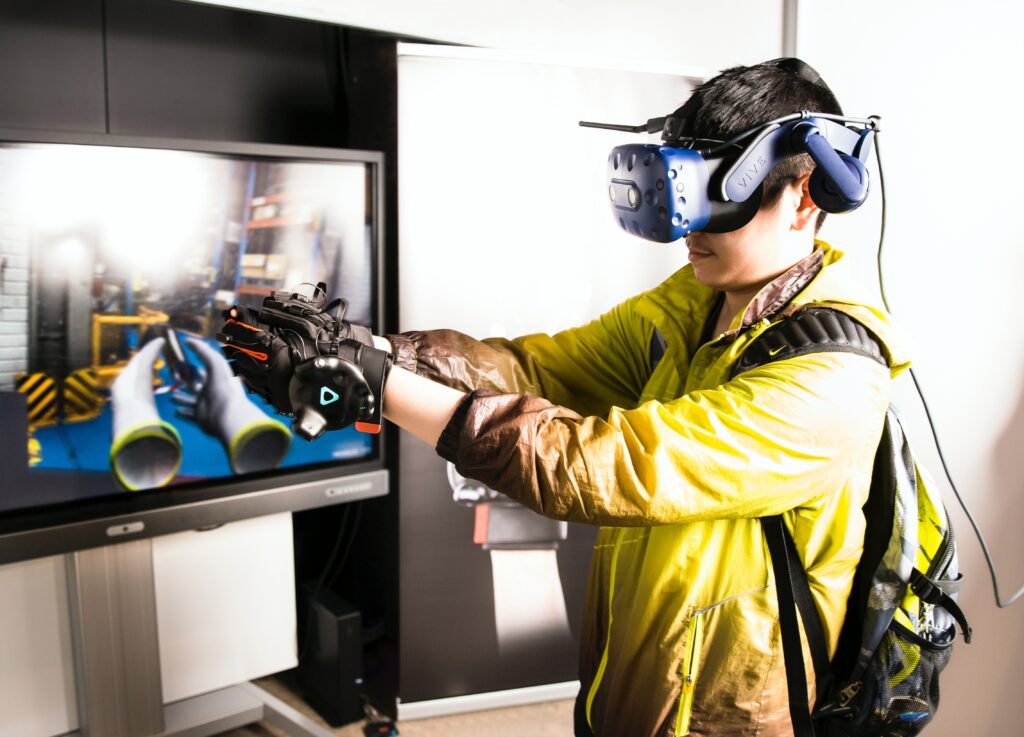Is Augmented Reality Shopping coming soon ??

Augmented Reality Shopping – Augmented Reality (AR) Shopping is a revolutionary concept that has been gaining traction in the retail industry. By combining digital elements with the physical world, AR Shopping has the potential to completely revolutionize the shopping experience. This technology not only allows customers to make informed purchasing decisions, but also offers retailers the opportunity to create a more immersive and interactive customer experience.
Is #AugmentedReality #Shopping coming soon ?? #ar #vr #tech #newtech
Augmented Reality Shopping
Augmented Reality Shopping is a new and exciting way for consumers to shop online. It involves the use of technology that overlays virtual objects onto the real world, allowing customers to view products in 3D, see how they would look in their homes or on their bodies, and even interact with them. This innovative shopping method has been gaining popularity rapidly due to its immersive and interactive experience.
The benefits of Augmented Reality Shopping are numerous. For one, it eliminates the guesswork involved in shopping online by providing customers with a realistic view of products before making a purchase. Additionally, it can make the shopping process more enjoyable and engaging by adding an element of fun through visualizing items in unique ways. Not only that but businesses using this technology can provide a unique customer experience which leads to higher engagement rates.
What is AR?
Augmented Reality, or AR, is a relatively new technology that has been gaining popularity in recent years. It is a type of technology that overlays digital content onto the real world around us. AR can be experienced through mobile devices such as smartphones and tablets or via specialized headsets.
The most common way to experience AR is through smartphone apps that use the device’s camera to capture the user’s surroundings and overlay digital objects onto them. This allows users to see virtual objects as if they were physically present in their environment. For example, you could use an AR app to place furniture in your living room or try on clothes without leaving your house.
AR can also be used for more practical purposes such as education and training. It allows for an immersive learning experience where virtual elements are overlaid onto real-world environments, creating a more engaging and interactive learning experience.
Benefits of Augmented Reality Shopping
Benefits of AR Shopping are numerous and have the potential to revolutionize the way we shop. Augmented Reality (AR) technology is a new trend in the retail industry that provides customers with an immersive shopping experience. By using AR, shoppers can now visualize products in 3D and try them on virtually before making a purchase.
One of the primary benefits of AR shopping is that it enhances customer engagement significantly. With AR, customers can interact with products like never before, giving them a better understanding of what they’re buying. This technology also enables retailers to personalize their offerings based on customer preferences and behavior data, which leads to more sales and brand loyalty.
Another advantage of AR shopping is its convenience factor. Customers no longer need to visit physical stores or try on clothes physically as they can do so from the comfort of their own homes through this technology.
Challenges for Adoption
The adoption of Augmented Reality (AR) in shopping has been slow and challenging. Despite the potential benefits, such as increased engagement and better customer experiences, AR shopping faces several hurdles that are hindering its widespread adoption. One of the main challenges is the lack of awareness among consumers about AR technology and how it can enhance their shopping experience.
Another challenge is the cost associated with implementing AR technology in retail stores. The cost includes not only purchasing hardware but also creating content that utilizes AR features. This makes it difficult for small businesses to adopt this technology and compete with larger retailers who have more resources to invest in AR.
Moreover, there is a lack of standardized formats for creating AR content, which makes it difficult for developers to create engaging and interactive content for shoppers.
Companies Leveraging AR
Companies Leveraging AR technology are revolutionizing the way businesses operate. Augmented Reality (AR) is a technology that superimposes information, images, or videos onto the real world. It is useful in various industries such as retail, education, healthcare, and entertainment.
One of the companies leveraging AR is Ikea. Ikea’s AR app allows users to visualize how furniture will look like in their homes before purchasing it. This eliminates the need for customers to visit an Ikea store physically; hence reducing costs associated with setting up showrooms. Companies such as Adidas and Nike leverage AR by providing customers with interactive experiences using their smartphones when trying on shoes virtually.
In conclusion, Companies Leveraging AR technology are finding innovative ways to provide value to their customers while reducing costs associated with traditional methods of operation. This trend is expected to continue as more companies embrace this technology and seek new ways of utilizing it in their operations.
Future of Augmented Reality Shopping
The future of AR shopping promises to revolutionize the way we shop. Augmented Reality (AR) technology is already making its way into our daily lives, and it’s only a matter of time before it becomes an integral part of the shopping experience. With AR, shoppers can try on clothes virtually or see how furniture will look in their home before making a purchase. This not only provides convenience but also helps eliminate the uncertainty that comes with online shopping.
As advancements continue in AR technology, so too does its potential impact on the retail industry. Brands can use AR to create personalized experiences for customers through virtual product try-ons or interactive displays that cater to individual preferences. Additionally, retailers can collect data on consumers’ behavior and use it to improve their marketing strategies.
The future of AR shopping is not just limited to fashion and home goods.
Augmented Reality Tech Companies
Augmented Reality tech companies are revolutionizing the way we interact with the world around us. The technology uses a combination of sensors, cameras, and software to overlay digital content on top of real-world objects. This creates an immersive experience that can be used for a variety of purposes, from entertainment and education to marketing and advertising.
One example of an Augmented Reality tech company is Blippar, which specializes in creating immersive experiences for brands. Their technology allows users to scan products or advertisements with their smartphone camera and receive relevant information or interactive content overlaid on top of the image. Another company in this space is Magic Leap, which has developed advanced AR glasses that can project realistic 3D images directly onto the user’s retina. This creates a truly seamless augmented reality experience that feels like it’s part of the real world.
Facebook / Meta & Augmented Reality
Augmented Reality (AR) technology is changing the way we interact with our social media platforms. Facebook, the world’s largest social network with over 2 billion users, has recently introduced AR technology to its platform. With this new feature, Facebook users can overlay digital content onto their real-world surroundings in real-time using their smartphones’ cameras.
Augmented Reality on Facebook allows businesses and individuals to create immersive experiences for their audiences. Brands can use AR filters and effects to promote their products, while influencers can use it to increase engagement on their posts by adding more interactive elements. Users can also create personalized AR content that they can share with friends or post on their timelines.
Facebook’s introduction of augmented reality brings new opportunities for advertisers as well. Advertisers can now incorporate interactive ads that allow users to explore different products in a more engaging way.
Conclusion: Unlocking New Possibilities
Unlocking New Possibilities AR Shopping has been gaining popularity in recent years as retailers and brands aim to enhance the shopping experience for their customers. Augmented Reality (AR) technology allows shoppers to interact with virtual products and visualize them in real-world environments before making a purchase. This new technology is revolutionizing the way consumers shop, providing them with more information about products, greater selection options, and a personalized experience that can improve customer satisfaction.
AR technology is also helping retailers increase sales by reducing returns as customers have a better understanding of what they are purchasing. In addition, retailers can reduce overhead costs associated with physical inventory while increasing customer engagement through interactive experiences such as virtual try-ons or product demonstrations. Unlocking New Possibilities AR Shopping is also helping brands reach global audiences by breaking down geographical barriers and expanding online shopping opportunities beyond traditional methods.
https://www.epicheroes.com/2018/02/09/augmented-reality-esports-coolest-thing-ever/
Follow us for New Content Daily
Web – www.epicheroes.com
Twitter @epicheroes
Insta @epicheroesuk
http://www.youtube.com/c/Epicheroes
https://amazon.co.uk/shop/epicheroes
 Epic Heroes Entertainment Movies Toys TV Video Games News Art Pop culture news goodness
Epic Heroes Entertainment Movies Toys TV Video Games News Art Pop culture news goodness


